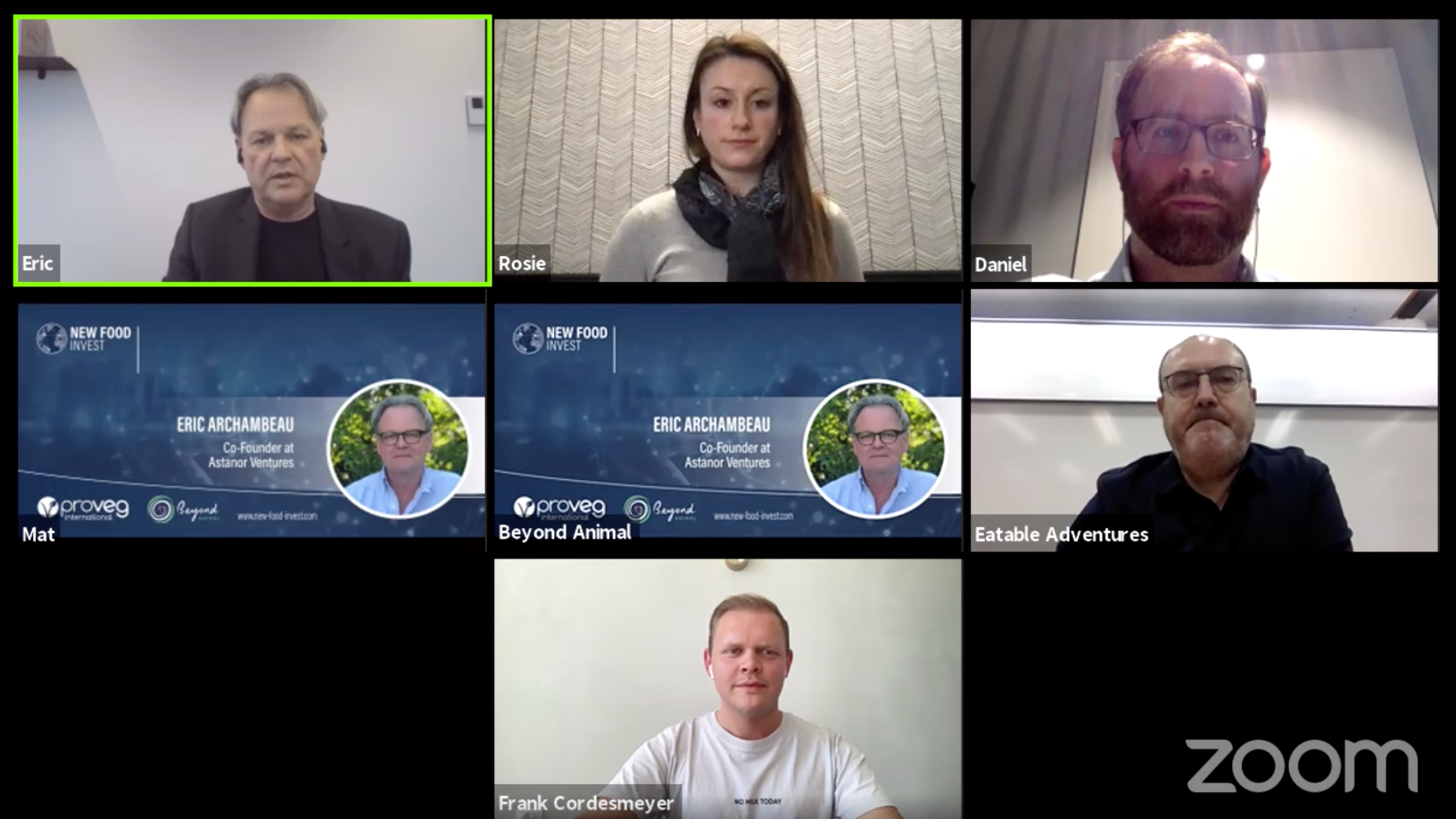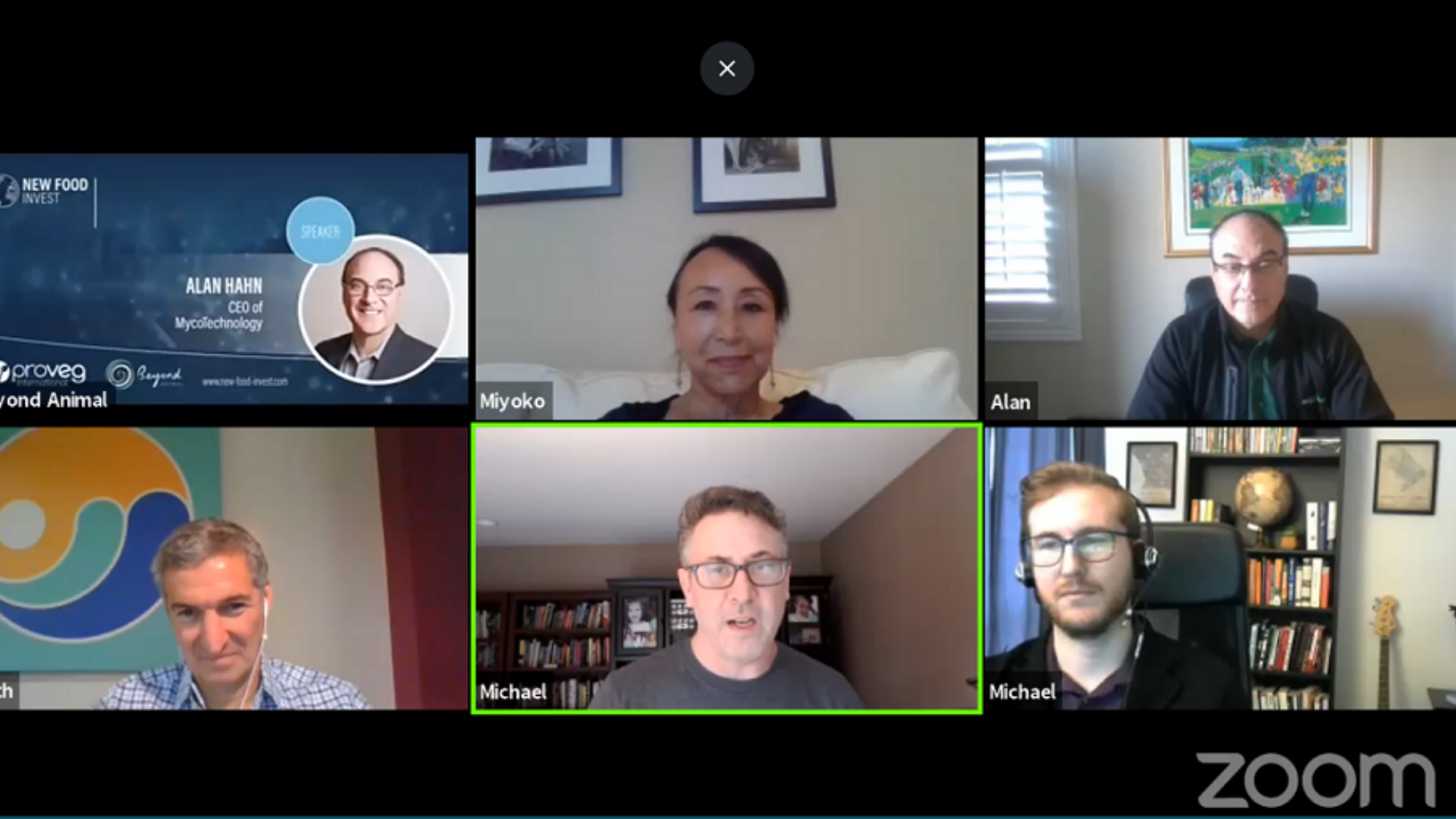The alternative proteins market is increasingly attracting investors’ attention. Money is pouring into the alt-protein space in Europe, with 2019 described as “a record-breaking year” for European foodtech. Investments have been on an upward but uneven trend for a few years: 2017 was a record year with €1.5bn invested, then in 2018 the total capital invested was almost halved, yet in 2019 skyrocketed to €2.4bn.
How attractive are European foodtech companies to international investors? What differentiates European founders from other entrepreneurs around the world? How much support do alt-protein startups receive now and how challenging is it to kick-start projects? On March 8, expert investors gathered at the New Food Invest virtual conference in a panel discussion on investment opportunities in the European alt-protein segment.
The experts on the panel were: Eric Archambeau, co-founder of Astanor Ventures and former Silicon Valley tech entrepreneur and pioneer in impact investing, whose investments include Spotify, XING, PriceMinister and Betfair; Rosie Wardle, partner and co-founder of Synthesis Capital and former investor at CPT Capital, which was behind firms like Beyond Meat, Impossible Foods, and Memphis Meats; Frank Cordesmeyer, Managing Partner and founder of Good Seed Ventures and a mentor at the ProVeg Incubator; and José Luis Cabañero, CEO and co-founder of Eatable Adventures, an F&B innovation ecosystem connecting emerging talents with industrial and financial partners. The session was moderated by Daniel Skaven Ruben, consultant at The Rockefeller Foundation Food Initiative, mentor to Big Idea Ventures and operating expert at Nordic FoodTech VC.
Below is an extract from the panel discussion, edited for length and clarity.
Ruben: What do you think are some of Europe's strategic advantages when it comes to innovation in the alt-protein space compared to other hotspots like the US, Asia and Israel, for example?
Cabañero: The most important thing for a startup is to ultimately get access to the market. That, for [Europe], is the biggest asset we have when we're compared to other ecosystems like Israel or Singapore that have territorial limitations. Also if we compare us to the US, their road to the market is possibly more complex than Europe where we have a few distribution points to reach all of the [European] population.
Cordesmeyer: I believe Europe is ideally positioned for accelerating the growth of startups in the alt-protein space, although we are still a little bit behind. I'm based in Tel Aviv now, and I’m seeing a collaborative and innovative ecosystem here that is so much different than in Europe. In the Israelian ecosystem, they are supporting each other in order to create platform technologies that can be scaled around the world. This is something we are lacking in Europe, although we have a very strong corporate infrastructure and established industries. It's fantastic to see that these established industries are increasingly starting to collaborate with startups as they are recognizing the need for innovation and collaboration.
Wardle: Innovation has been very much beyond Europe compared to the US, for example, which has been the leader. Over the past two years, we've seen Isreal as an emerging leader in the sector in terms of innovation and the opportunities we're seeing are honestly amazing. The technologies they're working on, whether it is redefined meat or pioneering on the 3D printing side, are truly exciting. Now we are also seeing some real diamonds coming up in Europe and the European plant-based ecosystem is starting to develop.
Archambeau: I would like to touch on another dimension, which has to do with the entrepreneurs themselves: their level of ambition. We often see entrepreneurs in Europe, including the UK, that are aiming to build a company of a few tenths of a million, and then being acquired by someone. When you go to the US and you meet entrepreneurs like the founders of Impossible Foods, you see truly ambitious people who are there for the long play. They are not ambitious to make more money than the others; they're just ambitious to foresee a future where their company is breaking through a very large segment of the market.
What about the regulatory landscape? We heard so much about labeling laws, whether to use GMO or CRISPR. How does that impact alt-protein entrepreneurs and startups?
Wardle: There is just a lot of uncertainty around the regulatory path in Europe at the moment, and it's still a very big question mark. When looking at the biotech approaches, whether it's cultivated meat or recombinant proteins, or even plant-based, there are still barriers in Europe. [But], speaking broadly, regulators, even in the more conservative jurisdictions in Europe, are recognizing the need to transition food systems. The European Food Systems is a massive part of that.
There is just a lot of uncertainty around the regulatory path in Europe at the moment
After Brexit, the UK established a national food strategy review, looking at potential avenues to be more forward-looking on biotech approaches. There's currently a consultation around genetic engineering approaches for plants and broader protein technologies. Looking at the bigger picture, a food system transition has got to happen, regulators have got to get onboard with this.
Do you think Europe lacks access to funding at any part of the capital continuum from pre-seed onwards?
Cabañero: Europe has a lot of money and new [investment] vehicles are appearing; however, most of these are focused on growth phases. In the pre-seed stage, there’s always a lack of money and there is no way we are going to change this. There are many new startups and the pace of innovation in the area is so large that there will always be less money than startups looking to be funded. In the pre-seed phases, it’s very important to get the right investors that can shape those companies and adjust them to the market while preparing them for the Series A and growth phases. We also see the need for corporates to innovate together with startups. Corporations need to embrace these new technologies to create better and more sustainable production systems. We therefore need more corporate vehicles to get into this market. This is what will ultimately help investors to have their exits and what the market needs to develop properly in the future.
What's the difference between Europe and Israel in terms of access to funding?
Cordesmeyer: In Israel, it's easier to get funding at an early stage since there are more VCs and corporates that engage in pre-seed phases before Series A. It's also easier for entrepreneurs who haven't founded their company yet but are still developing their solutions at universities and research centers. There’s also more funding available in this stage, which makes it easier for entrepreneurs to accelerate their solutions from a point to Series A, once larger corporations engage as well.
We see record levels of funding going into alt-protein startups. Do you think there's a bubble brewing, where we might see dumb money being invested into companies that won't be able to reach their milestones and we might see a wave of bankruptcies in the near future?
Archambeau: Fear is not the right term. I think what we do, all of us together as a group of investors, is playing a very Darwinian system. There will be companies that will not make it and there will be winners. There are always ups and downs in the markets, public and private markets. We are clearly in a rich valuation phase right now. In the end, those companies that are likely to become very valuable over time are those capable of truly innovating, that have truly differentiated technologies, and a supply chain they can control up to a point that is sufficient for growth.
Where do you think the future unicorns will come from in terms of plant-based seafood, cheese and eggs?
Wardle: The next unicorns are most likely to happen in the plant-based space. The companies today are the closest to an opportunity for backing, merger or acquisition. A question mark or concern I have is whether those companies are actually able to absorb a capital injection that needs to be very well executed. You need a management team and a strategy in place to absorb that capital in the right way. So my big question here is, how many of them are actually ready for that type of exit opportunity, IPO or stock merger?
We are clearly in a rich valuation phase right now
Archambeau: It's a reverse merger. So, it's like going out for a night drinking, like the equivalent of a month worth of alcohol, waking up the morning after managing a public; that's what SPACs are about. If your management team is not ready, you're in big trouble. On the other hand, for a number of companies, it’s a fantastic accelerator and a fantastic way to get access to much more capital than you would have had in the private market.
How important are ESG and sustainability factors? How do you assess those before you invest? What variables or factors are important?
Cordesmeyer: ESG and CO2 outputs from certain technologies in the food industry are incredibly important to us; that's one of our four pillars when evaluating startups. The first factor we always look at is the impact: how much CO2 reductions do we get through this solution, and that's not only on a regional level but especially on a global level. The second criteria is the scalability of a solution. We look at platform technologies that could be deployed globally. To be truly honest, we're still figuring out ways of how we can measure the future impact of many solutions and how much CO2 we reduce through alternative dairy or meat products, but we're looking into this very closely.
In a few words, what could make your life as an investor easier?
Wardle: Right now, being able to meet companies in person. I mean we've all got very used to the Zoom way of life but a critical part of assessing any [investment] opportunity is tasting the product.
Archambeau: Having a better matching between investors and entrepreneurs. We spend a lot of time explaining to people they may have a great idea but it’s not [a good fit] for us. Meanwhile, they are missing the opportunity to talk to people that are a better match.
Cabañero: We work with startups in their emerging stage; it would help to understand what’s behind them, their intellectual property, whether it's solid or not, and whether there's going to be a market for that.
Cordesmeyer: I would love to work more with European universities, with patent offices and entrepreneurs in their early stage at universities. I'm sure many VCs see it the same way,. They’d like to have access to entrepreneurs in the early phase. Universities should facilitate this.
CompassList is an official media partner of New Food Invest 2021.











